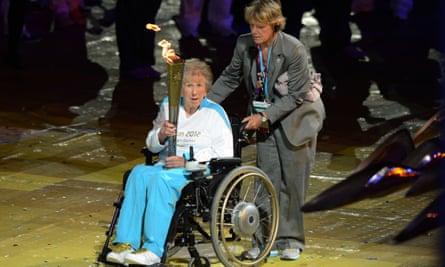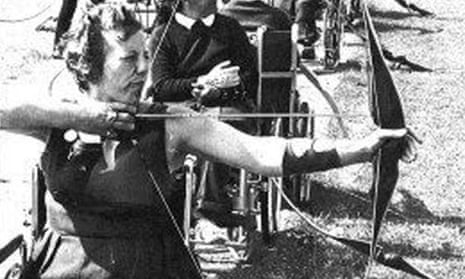There was a time when Margaret Maughan, who has died aged 91, would have bristled at any suggestion she might be sporty. “I was just no good at it,” she said. Little did she ever expect that a car accident which left her paralysed from the waist down in her early 30s might unlock a broad range of athletic talents and see her carve a place in history as the UK’s first Paralympic gold medallist.
Maughan won archery and swimming gold medals at the Rome Paralympic Games in 1960, and although she missed the next games in 1964, she took part in four more up to 1980, winning two more golds along the way. In 2012, at the age of 84 and in recognition of her achievements, she was given the honour of lighting the cauldron at the Olympic Stadium in London during the opening ceremony of the 2012 Paralympics.
A huge debt, she acknowledged, was owed to Ludwig Guttmann, who oversaw her treatment at Stoke Mandeville hospital in Buckinghamshire after she had sustained her injuries while working as a teacher in Malawi in 1959. The German-born neurologist is widely recognised as the founding father of the parasport movement. To Maughan, he was both a stern taskmaster and an adroit source of motivation during her rehabilitation from a broken back.
Maughan had confessed to Guttmann, during one of his weekly rounds at the National Spinal Injuries Centre, that she was feeling bored and frustrated. He promptly admonished her, ordering her to look on the “positive side” despite the fact that she would never walk again.
As a passionate advocate of sport as therapy, he advised Maughan to get active, and when she did so she unearthed an innate ability in archery during monthly competitions held on the hospital grounds. Discharged into the care of her parents in Lancashire, she joined an archery club in Preston as a means to maintain her new hobby.
Barely 12 months later she was summoned back to Stoke Mandeville to participate in what turned out to be a trial for the British team for the inaugural Paralympics in Rome. Like most of the public, she knew nothing of what the event would entail. To her amazement she was invited to venture to the Italian capital as part of a squad of 42 men and women.

Those first Games were very different from the gargantuan jamboree of the current era. Lifted on to the plane by forklift for her departure, Maughan was carried up and down from her accommodation in Rome by recruits from the local military. “It was a bit chaotic,” she later reflected.
So chaotic, in fact, that Maughan did not even realise she had won her archery gold in the women’s Columbia Round competition, with arrows shot at different distances. Results were not made available upon its conclusion, and it was only while sitting on a bus at the end of the day that she was told she had won the event and was needed at the medal ceremony.
Her gold was Britain’s first, and she doubled her tally later by winning the 50 metres backstroke, in which she was the sole participant. A highly reluctant swimmer, assurances had been offered that she would not be required in the pool. However, at the last moment she was asked to swim to secure points toward a team duel with Italy. “I don’t think I’d ever swum 50 metres before,” she said. Although she completed the course and won the gold, the points she gained were not, in the end, enough to prevent Italy winning the overall team competition.Despite the ramshackle nature of the event, Maughan described the experience and the camaraderie as “marvellous”, and her love affair with the Paralympics had begun. She was victorious in the hybrid sport of dartchery (firing arrows at a dartboard) in Heidelberg in 1972, and won a silver in the same event four years later in Toronto, where she also took a silver in the lawn bowls pairs. At the Arnhem Games in the Netherlands in 1980 she won gold in the same discipline during her final appearance, bringing her career tally to four golds and two silvers.
Maughan was born in Much Hoole, Lancashire, to Madge (nee Holt), a teacher, and her husband, Charlie, a miner. After Balshaw’s grammar school in Leyland she trained as a teacher at the University of Edinburgh, and then found work as a domestic science teacher in Jamaica, eventually moving to Africa to teach in the British protectorate of Nyasaland (now Malawi). Six months into her time there, she was severely injured when a vehicle in which she was travelling overturned near the airport in the capital of Lilongwe. “I suppose we were going too fast,” she said in a BBC interview.
After initial surgery she was flown back to the UK for further treatment, and it was then that she came into contact with Guttmann. He remained a close ally until his death in 1980. Because of her disabilities, Maughan initially found it hard to convince anyone to take her back as a teacher, and she ended up working as a clerk in a factory in Lancashire.
Hearing of her difficulties, Guttmann arranged for Maughan to live more independently at the Duke of Gloucester hostel for paraplegic people in Middlesex, and after a long job search she was taken on by Leggatts Way school in Watford, where she found a sympathetic champion in the head teacher, whose husband was disabled. She worked there in her old role as a domestic science teacher until a move to nearby Bushey Meads school, where she remained until retirement.
Maughan was a long-time member of Watford’s archery club, for which she did much volunteer work, and also helped to establish the Stoke Paraplegic Athletic Club in Buckinghamshire. She was greatly pleased by the invitation to light the flame at the opening ceremony of the 2012 Games, which she described as “very emotional and impressive”, adding, with typical modesty: “Who would have thought that my gold medal, which has been kept in a bag in the drawer, would have brought me such fame?”
She is survived by her youngest sister, Ruth

Comments (…)
Sign in or create your Guardian account to join the discussion